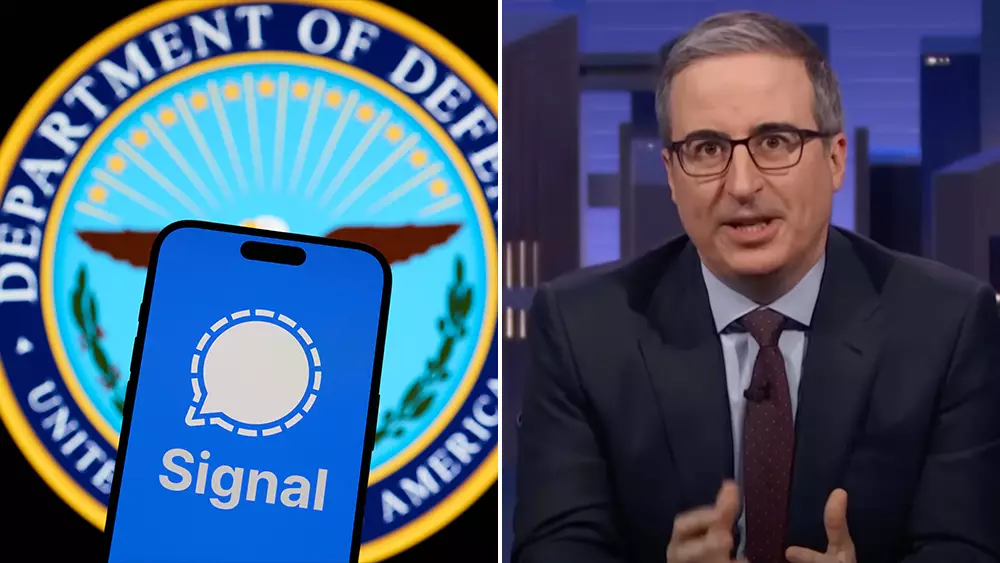In the world of political commentary, few voices cut through the noise quite like John Oliver’s. The British comedian and host of “Last Week Tonight” draws both laughter and poignant critique from the absurdities of governance. Recently, in response to the shocking Signal group chat leak from President Donald Trump’s administration, Oliver’s incisive analysis highlighted a fundamental problem: the lack of seriousness among those in power. With a headline as shocking as “The Trump Administration Accidentally Texted Me Its War Plans,” Oliver’s humor serves as a thin veil over the deep-rooted incompetence that has plagued contemporary leadership.
While many might dismiss Oliver’s witty delivery as mere entertainment, the implications of his statements carry heavy consequences. The emojis used within the compromised chat, including symbols like fists, flags, and the infamous muscle and flame, exemplify a troubling disconnection from reality. To equate such binary emotional symbols with grave matters of state, particularly following catastrophic military actions, is emblematic of a broader trend of frivolity masquerading as governance. For Oliver, these emoji choices underscore a pervasive unseriousness, paralleling the absurdity of choosing the right Minion meme after a tragedy. It’s just misplaced; more than misplaced, it’s dangerously irresponsible.
The Dangers of Incompetence
The premise of Oliver’s critique lies in how a cavalier attitude permeates critical policy decisions, particularly those involving the treatment of vulnerable populations. Recently, the mass deportation of Venezuelan migrants and their alleged affiliations with the crime organization Tren de Aragua raised alarming questions about due process and human rights. Oliver’s astonishment at the rationale behind these deportations—often as flimsy as a tattoo or an error in documentation—serves as a stark reminder of how callousness can intermingle with authority.
What’s worse, the presentation of such policies by figures like Homeland Security Secretary Kristi Noem is staged against backdrops laden with historical weight. Prominent images of fenced-in prisoners evoke a chilling echo of the past, where humanity was sacrificed on the altar of governance. Noem’s choice to position herself in front of detained individuals who are stripped of dignity encapsulates the administration’s overarching theme of cruelty. This alarming trend insists that policy decisions are not merely administration exercises but have real human consequences.
Comedy as a Mirror
Oliver skillfully wields humor as a tool that exposes uncomfortable truths about our political landscape. His critique of grotesque imagery in the political sphere, such as the sinister backdrop of caged prisoners paired with the casualness of official communication, serves to illuminate the moral decay responsible for such scenes. It’s not simply the absurdity of emojis or the horror of images that requires scrutiny; it is also the broader implications of governing bodies that lack empathy and are disconnected from the realities faced by the populace.
Deeply unserious people can create deeply serious outcomes. Oliver’s sharp wit acts as a conduit for societal reflection: how can we allow those grossly out of touch with the plight of others to dictate policy? This chilling observation has permeated modern governance, where the trivialization of grave issues creates a cycle of incompetence and insensitivity, distancing itself from compassion.
Meanwhile, Oliver recognizes that the beleaguered administration does face considerable criticism for its actions, but the real hazard is the irreversible damage already done. In rhetoric filled with careless bravado and bubble-like assurances, lives are impacted in ways that are not merely statistical but profoundly human.
John Oliver’s incisive take on the recent signal leak does more than entertain; it poses vital questions about the leadership currently governing society. By dissecting the frivolity and incompetence of governmental actors, we are encouraged to hold them accountable and reflect critically on the path forward. The politics of seriousness, it appears, are far from a joke.
